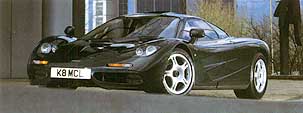 Heidfeld
and Raikkonen, the Sauber stars
Heidfeld
and Raikkonen, the Sauber stars
This has been a rushed week for the GP circus, with the
European GP last weekend and now the French this weekend. This should
start at 7 p.m. by my (sometimes inaccurate) reckoning, and I will be
watching from my bar stool perch at Shenanigans. Join me in front of the
big screen and we’ll see what the world’s most highly paid cab drivers
can do this week.
The top 10 performance cars in the world
The latest edition of Autocar came across my desk the
other day (thanks Martyn Quartly) and they had a feature on the top 100
performance cars of all time. I must say that how some of them managed to
get on the list beats me. For example, the 1973 Alfasud Ti. Top speed 160
kph (down a mine shaft I reckon) and 0-100 kph times of 14 seconds.
Performance car? Come off the grass. In 1973 the RS Carrera Porsche did
240 kph and 0-100 kph in 5.5 seconds. Now that’s a performance car!
Anyway, their list of the top 10 is interesting, (even
if it is crazy in some areas).
1st McLaren F1. With a top speed of almost 400 kph and
a 0-100 kph of 3.2 seconds, it is the quickest road car ever built and
deserves the number 1 position, even if it did cost almost 40 million baht
in the UK at the time (1994).
 McLaren
F1
McLaren
F1
2nd position was the Porsche 911 RS of 1995 which could
do 256 kph and 0-100 in 5 seconds. Yes, I’d agree that this should be in
the top 10.
Number 3 was given as the 1980 Audi Quattro. A car
which did 225 kph and a 0-100 time of 6.3 seconds. Two years earlier, in
1978 the BMW M1 did 260 kph and 5.5 for the 0-100 time. Scratch the Audi
Quattro.
4th was the Ferrari F40 which in 1987 did 320 kph and
covered the 0-100 kph in 3.9 seconds. A deserved top 10 contender.
5th was given as the 1994 Subaru Impreza, a car that
did 220 kph and 0-100 in 5.8 seconds. Another I don’t agree with. After
all, one year later in 1995 you could have a Dodge Viper that did 275 kph
and did 0-100 in 5.3 seconds.
 Ferrari
Ferrari
6th was the current BMW M5 which can do 257 kph and
0-100 in 5.3 seconds. Undoubtedly a great car - but look at the
performance compared to the Viper.
7th was quoted as the Jaguar E Type which in 1961 did
240 kph and rattled through the 0-100 in 7.2 seconds. Sure, this thing was
an eye opener in those days and I remember driving one and being blown
away by the power and torque - but we are talking “performance” cars
here. Jaguar’s own XK SS did 230 kph and 5.2 for the 0-100 4 years
earlier, while the ’61 Ferrari 250 GTO did 290 kph and 0-100 in 5.0
seconds. Liked the E Type, but it shouldn’t be there at number 7.
8th has me totally beaten. The Mazda MX5 of 1990 was a
great little fun car. I owned one for three years and loved it. But a
“performance” car? Never! With a top clip of 180 kph and 0-100 in 9.1
this cannot be included in a top 10. The Porsche 959 three years earlier
did 315 kph and covered the 0-100 in 3.7 seconds.
Number 9 is the 1996 Lotus Elise, which can clock 200
kph and did the 0-100 in 5.5. Great car again, but really in the top 10?
 TVR
Cerbera
TVR
Cerbera
Finally, their 10th place was taken by the Honda NSX.
This Honda in 1991 would do 260 kph and lope through the 0-100 in 5.9
seconds. I have driven a few NSX’s and while they are wonderfully
forgiving motor cars, the long legged gearing makes them feel not quick
under acceleration. Another doubtful top tenner in my opinion.
For the record, here’s my top 10 “Performance”
cars - nothing to do with more bang for your baht. This is raw
performance. The McLaren F1 has to be there, plus any of the high
performance Porsche 911 variants like the 959, for example. Ferrari’s
have to be in there, so let’s go for the F40. Also in this list would
have to be the Jaguar XJ 220, with its 340 kph top speed and 0-100 in 3.6
seconds, surely. The TVR Cerbera would be in there too, with its 300 kph
and 0-100 in 4 seconds.
I’d have to throw the Nissan Skyline R33 in the list
too, with its 250 kph and 4 second 0-100. The Lambo Diablo has to be
there, even though it is a ridiculous motor car to drive on the road (yes,
I have done an extensive test on one), but with a top speed of 330 kph and
0-100 in 3.8 seconds, it oozes performance. Another exotic is the Bugatti
EB110, with a top speed of 340 kph, but a little slower in the 0-100 at
4.5 seconds. Another top tenner and one that I have never seen is the
Noble M12 GTO which can do 250 kph and 3.9 seconds 0-100 (very similar to
the Nissan Skyline R33). Add in the Ford GT40 with its 320 kph and 5
second 0-100 and the BMW M Coupe at 260 kph and 4.9 second 0-100 and you
have ten real performance cars. Any of you who have got others you would
consider to be top 10 vehicles, drop me an email.
Haynes Manuals
Anyone who has even the slightest spark of DIY in them
would be familiar with the Haynes Manuals. The official repair book as
issued by the manufacturer is not written with the DIY man in mind. I can
always remember reading the MGA handbook on how to remove the Hardy Spicer
uni from the prop shaft. “Tap the yoke lightly and the bearing should
emerge,” said the book. This is a complete and utter make-up. You can
tap the housing all day and nothing will happen. You can drown it in WD40,
CRC or Sonax or any other of the wonderful dewatering lubricants and
nothing will happen. Brute force and shatter the case hardened needle
roller cup is the only answer. Anyone who has done it will undoubtedly
agree.
Anyway, courtesy of an email from my motorcycling mate,
Alan Coates, here is a little bit about the correct translation of some of
the technical terms in Haynes Manuals.
Haynes - Rotate anticlockwise.
Translation - Clamp with molegrips then beat repeatedly
with hammer anticlockwise.
Haynes - This is a snug fit.
Translation - You will skin your knuckles!
Haynes - Pry...
Translation - Hammer a screwdriver into...
Haynes - Undo...
Translation - Go buy a tin of WD40 (catering size).
Haynes - Retain tiny spring...
Translation - “Jeez what was that, it nearly had my eye out”!
Haynes - Press and rotate to remove bulb...
Translation - OK - that’s the glass bit off, now fetch some to dig out
the bayonet part.
Haynes - Compress...
Translation - Squeeze with all your might, jump up and
down on, swear at, throw at the garage wall, then search in the dark
corner of the garage for whilst muttering “bugger” repeatedly under
your breath.
Haynes - Inspect...
Translation - Squint at really hard and pretend you
know what you are looking at, then declare in a loud knowing voice to your
wife, “Yep, as I thought, it’s going to need a new one”!
Haynes - Carefully...
Translation - You are about to cut yourself!
Haynes: Retaining nut...
Translation - Yes, that’s it, that big spherical blob of rust.
Haynes - Get an assistant...
Translation - Prepare to humiliate yourself in front of someone you know.
Haynes - Turning the engine will be easier with the spark plugs removed.
Translation - However, starting the engine afterwards
will be much harder. Once that sinking pit of your stomach feeling has
subsided, you can start to feel deeply ashamed as you gingerly refit the
spark plugs.
Haynes - Refitting is the reverse sequence to removal.
Translation - But you swear in different places.
Haynes - Prise away plastic locating pegs...
Translation - Snap off...
Haynes - Index
Translation - List of all the things in the book bar the thing you want to
do!
For Added Haynes Fun - Go to the lovely colour section
on body repairs - as you look at these two pages say to yourself over and
over until it sinks in “mine will never look like that...”
NB: Haynes Manuals are (c)opyright of a very disturbed
sadist.
Autotrivia Quiz
Last week I wrote that Works Mercedes driver Herman
Lang won the Swiss GP in 1939. The next time a Mercedes won the Swiss GP
was in 1954, when the late and great J.M. Fangio stormed home to win,
leading from start to finish. The question was - why did Mercedes never
again enter this GP?
The answer was very simple. Following the multiple
fatalities at the Le Mans 24 hour race Switzerland banned motor racing and
there never has been a Swiss GP since.
So to this week’s quiz question. In 1966 Ford Motor
Company won Le Mans with their GT40’s. This was a milestone for America,
because it had been many years since America had done well at the 24 hour
classic. In fact, previous to 1966, the best American race car placing was
a second. The question is - what was the year and what was the car that
came in second?
For the Automania FREE beer this week, be the first
correct answer to fax 427 596 or email [email protected]